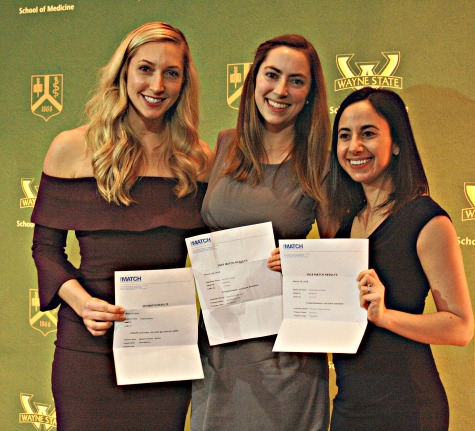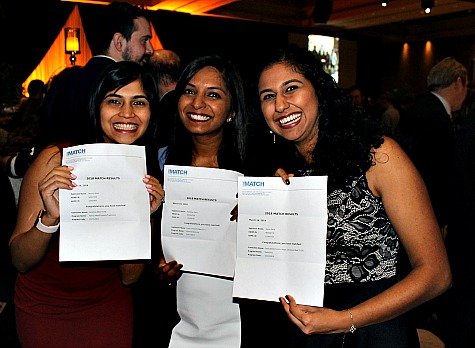
The Match Day celebration for the Wayne State University School of Medicine Class of 2018, held March 16 in the MGM Grand Detroit’s Grand Ballroom, was the penultimate celebration of at least the last four years for nearly 300 physicians in training who will graduate in June, resulting in a 98.32 percent residency match rate for the Class of 2018’s Match participants.
“This is not an easy road. Your instructors here demand much, and your patients will do the same,” said School of Medicine Dean Jack D. Sobel, M.D., who welcomed everyone wearing his white physician's coat because he came directly to the event from clinic appointments with his patients.
The Match Day event for the Class of 2018 mirrored events held at medical schools throughout the country, and follows the protocol of the National Resident Matching Program, a private non-profit corporation established in 1952 to provide a uniform date of appointment to positions of graduate medical education in the United States. The 2018 Main Residency Match is the largest on record.
WSU’s rate surpasses this year’s national match rate of 94.27 percent for allopathic students, in a year that saw 43,909 applicants apply for 32,910 available residency positions in the United States. A total of 19,312 U.S. seniors participated in the Match.
WSU students will fill residency slots in 23 different specialties, the top three being Internal Medicine, Family Medicine and Emergency Medicine, with 48.1 percent of the Class of 2018 getting a spot in one of their top three choices.
Students were informed via email March 12 whether they matched with one of their preferred residencies following interviews that began in late 2017. The physicians-in-training will receive their medical degrees in June, and start residencies in July.

In Detroit, more than 900 students, faculty, staff and family counted down the seconds before their sons, daughters, wives, husbands and siblings opened envelopes containing their residency assignment for the next three to seven years, depending on their specialty. Only minutes before the countdown to noon, envelopes were placed in the hands of the 299 senior student match participants in the Class of 2018.
A hefty 51.8 percent of WSU’s Class of 2018 will stay in Michigan. The increase is great news for a state with a projected physician shortage, as studies show that residents who train in Michigan often remain here for the majority of their careers.
Another 41.1 percent will enter primary care residencies, which includes Internal Medicine, Family Medicine, Pediatrics and other specialties.
Andrew Darmahkasih is moving across the country after graduation, and he couldn’t be happier. He will begin a residency in Pediatrics at Children’s Hospital of Orange County, a program affiliated with the University of California at Irvine.
“I fell in love with the program when I visited. It was pretty high on my ranking list, and I’m thrilled,” he said.
Overall, 21 Michigan-based health systems and centers will welcome Wayne State University graduates to residencies this summer, including 40 to the Detroit Medical Center, 30 to the Henry Ford Health System, 17 to the University of Michigan, 15 to Beaumont Health System and 14 to Beaumont-Oakwood.
Students moving out of state will practice medicine in 32 states, at more than 70 hospitals, universities and medical centers, including Yale University’s New Haven Hospital, Stanford University, Boston University Medical Center, Hofstra Northwell School of Medicine, Johns Hopkins Hospital, George Washington University in D.C., Penn State Hershey Medical Center and Rutgers-New Jersey Medical School.
Internal Medicine residencies were the most popular clinical discipline at WSU this year, with 55 students entering the specialty. Another 47 students will enter a Family Medicine program – an increase of more than 19 students from 2017 -- and 42 will enter Emergency Medicine.
About Wayne State University School of Medicine
Founded 150 years ago, the Wayne State University School of Medicine educates more than 1,000 medical students annually in Midtown Detroit. In addition to undergraduate medical education, the school offers master’s degree, Ph.D. and M.D./Ph.D. programs in 14 areas of basic science to about 400 students annually.
